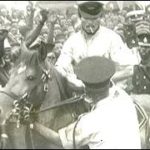There are two issues I need to address and I am going to do so as briefly as I can.
First is a question: Can the Bureau of National Investigations (or the police) hold anyone for a period not exceeding 48 hours? Yes! That’s what I said in the piece about the NPP’s irresponsible invasion of the premises of the Bureau of National Investigations. It’s the law.
But in in some of the comments on that piece, some readers suggested that I was wrong in asserting that NPP’s mini-demonstration would only have been justifiable if the former chief of staff, Kwadwo Mpiani, had been held for longer than 48 hours at the BNI.
- Advertisement -
For example, Fred asked: “Which constitutional provision or statutory law stipulates that without arrest the police or BNI may detain someone for 48 hours without charge?” And then, he asserted that one “must be arrested for the 48 hours rule to apply.”
Then came E. Agyei who also wrote: “How can you exhibit such ignorance by writing that the security agents can detain you up to 48 hrs?”
I have also heard some NPP lawyers say that the 48-hour rule only applies after an arrest had been effected.
I feel my blood ‘boiling’ when I hear people who should know better and those who pretend to know better try to defend the indefensible with ludicrous arguments, often proclaiming superior knowledge. One of such arguments is the one put forth by the NPP supporters who insist that since Mpiani had not been arrested (he went to the BNI on an “invitation”) the 48-hour rule did not apply and so their senseless grandstanding was borne out of a justifiable concern to ensure that Mr. Mpiani’s rights were not infringed upon.
Well, I am not a lawyer. But I can read – thank God!
In the fifth chapter of the 1992 constitution, there is a provision that clearly states in black and white that “a person who is arrested, restricted or detained for the purpose of bringing him before a court in execution of an order of a court; or upon reasonable suspicion of his having committed or being about to commit a criminal offence under the laws of Ghana, and who is not released shall be brought before a court within forty-eight hours after the arrest, restriction or detention.”
I don’t need a beard as white and as white as VCRAC Crabbe’s to understand this. This simply means that the security agencies do not only “arrest” but they can also restrict or detain. The NPP cannot hang on to that one word, “arrest”, and throw dust into our eyes. What happened to Mpiani on Tuesday could pass for a detention and restriction – for the purposes of interrogation, apparently on suspicion that he might have committed a crime. It could have gone on for 48 hours and it would have been perfectly legal.
So once again, that action was irresponsible and all the NPP stalwarts who partook in it must bow their heads in shame – if they have any left in them.
To those who accuse me of ignorance, how about checking Chapter Five of the constitution for yourselves? In any case, I see ignorance as an asset. I am not ashamed of the things I don’t know and whenever I get the opportunity, I’d gladly demonstrate my ignorance because I’ve learnt in my short, wretched life that the only way to acquire knowledge is to make an honest confession that you don’t know.
The second issue I want to address came up after Mr. Mpiani was released and, truth be told, it’s the only point on which I feel sorry for Mr. Mpiani on this matter. Mr. Mpiani’s lawyers insist that they were not allowed to participate in his interrogation. But government officials insist that they were present when he was questioned. I really don’t know who to believe. But my gut feeling is to go with Mr. Mpiani’s lawyers.
The BNI has in the past interrogated people in the absence of their lawyers and for them. The rule is that suspects under interrogation should have a right to legal representation and their lawyers should be present when they are being questioned. But the BNI tends to do things their own way – often with brute force and with very little regard for the law. For years, the BNI has operated as a power onto itself, often as a tool for intimidating opposition elements. This was the case under Rawlings’ regime. The situation was no different under Kufuor. And if what happened with Mr. Mpiani is anything to go by, the BNI bosses want to repeat it under Mills.
This should not be so.
There are so many questions Ghanaians are demanding answers to. These answers can only be provided by once-powerful government officials who are now in opposition – their wings clipped. In questioning these people (for as long as the law allows), the BNI and the other security agencies must be fair and legally scrupulous. Interrogating a man in one room whiles his lawyers are sequestered in another is a definite no-no! It doesn’t bode well for the rule of law. Such flagrant violations only give ammunition to people to accuse the government of political persecution. The NPP’s looting brigade is determined to dodge the questions they should answer and neither government nor the BNI should give them an excuse to do so. The right, lawful things must be done.
In President Mills’ determination to probe all the questionable dealings of the Kufuor administration, it is imperative that the human rights abuses that characterised the previous NDC administration – shaving of heads with broken bottles, for example – are not repeated. Whiles pursuing the plunderers, the government must also be working to ensure that the BNI is reformed to make it a strong, independent agency with loyalty to the state, not the ruling party. It will most definitely be a delightful icing on the cake and Ghanaians will appreciate that.


